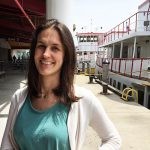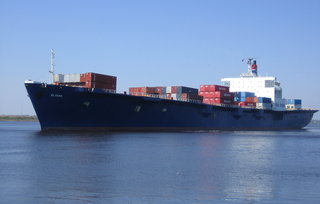TOTE Maritime Puerto Rico ships incur no financial penalties for the company if they are delayed in making their regular deliveries to the island, company president Tim Nolan told the Coast Guard board of inquiry investigating the Oct. 1 sinking of the El Faro Thursday.
“Traditionally there’s no adverse impact to the company…There’s no penalty if cargoes are delayed,” Nolan told the board, which among many issues is examining whether commercial pressures played a role in how the 790’ ro/ro containership’s route put it in danger from Hurricane Joaquin.
The company’s concern with weather or other delays is to advise customers so they can plan accordingly, Nolan said. The most time-critical cargoes are perishable goods, and TOTE has used chartered barges and tugs to move bulk cargo when more room is needed for perishables on its ships, Nolan told the board.
The loss of the El Faro and its 33 crew was the worst U.S. maritime disaster since the February 1983 sinking of the Marine Electric off Virginia with 31 deaths. A main goal of the board’s questioning is to determine why captain Michael Davidson was apparently planning to make his way between Jacksonville, Fla., and San Juan, Puerto Rico, ahead of the hurricane, before the El Faro’s main power plant failed.
In testimony, TOTE executives and managers have repeatedly said course changes and weather routes are ultimately the decision of their captains, without need for prior approval from shoreside management.
Mate Charles Baird testified about sailing on El Faro with Davidson in August 2015, and discussing with him preparations to deal with two earlier tropical storm systems – Hurricane Danny and Tropical Storm Erika. Those plans included taking the Old Bahama Channel, a route closer to the islands that is more protected from high waves than the Atlantic route east of the islands. During Erika, ‘we deemed it more prudent to go through the Old Bahama Channel,” Baird recalled. ‘We knew where the storm was…we knew we’d be close to it.”
Baird mentioned the ship’s anemometer was in need of repair. Baird said he did not know if that got attention before the El Faro left Jacksonville for the last time, but without the anemometer, it would have been difficult to judge higher wind speeds.
“You’re going to hear a racket,” he said of sounds on the navigation bridge during a big storm. “It sounds like a train going by.”
But TOTE captain John Lawrence was dismissive of the need for an anemometer, given other data and sea state a captain can see: “I don’t use the anemometer to base a decision…on what’s going on with a vessel.”
As with setting courses, TOTE captains have final authority over cargo and how it is carried, according to captain Earl Lotfield, who has commanded both El Faro and its Ponce-class sister ship El Yunque.
TOTE’s business increased after the demise of Horizon Lines in late 2014, with an increase in the number of refrigerated containers, vehicles and other cargo.
“They were in a death spiral,” Lotfield recalled of Horizon. “More of the shippers were shifting over to Sea Star Lines,” the corporate predecessor of TOTE Maritime Puerto Rico.
In his early years in the Puerto Rico trade, Lotfield said, 10,000 tons of cargo on a trip “would be cause for celebration.” In recent years cargoes reached 12,000 tons on about one-third of the trips, and the ships were configured to carry up to 286 reefer containers, he said.
Preparing those cargoes for potential heavy weather was always taken care of at the company’s Jacksonville and San Juan terminals, Lotfield said.
“My experience is those things are anticipated and already put in place” by port managers who put on extra workers to lash cargo, he said.




